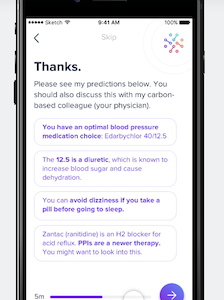 Last week the start up Doc.ai came out of stealth mode to announce its intentions. Led by CEO Walter De Brouwer, the company is leveraging natural language processing (NLU) and machine learning to offer a conversational personal medical advisor.
Last week the start up Doc.ai came out of stealth mode to announce its intentions. Led by CEO Walter De Brouwer, the company is leveraging natural language processing (NLU) and machine learning to offer a conversational personal medical advisor.
According to information available on the company’s website, the product is offered as Software as a Service and Deloitte is an early customer. The website also offers animated screen shots of a patient conversing with the assistant via a smartphone interface.
Patients answer questions posed by the automated advisor to build out a personal health profile. Based on the demo, it appears the patient should be willing to divulge a lot of potentially sensitive health information to the bot in order to reap the most benefits. The data hungry advisor wants to know things like what you look like (you need to take a selfie), how active you are (link data from your fitness tracker), how much you sleep (possibly inferred from your social media posts), and the results from your last blood test.
The company’s goal is to tap into big data from individuals, groups, and healthcare providers stored in a blockchain. Armed with a patient’s individual health details and with data from many others, the Doc.ai assistant can make predictions about future health outcomes. Acting as a medical advisor, the assistant also offers recommendations, for example changes in diet and exercise.
Walter De Brouwer’s previous work hasn’t been without controversy. In 2013 his company Scanadu ran a highly successful Indiegogo campaign for a personal medical device called the Scanadu Scout. After collecting personal health data from users who paid $200 for the device, the company kept the data but deactivated the devices. Many users were understandably unhappy.
The trend toward NLU-powered personal advisors continues to grow. The question remains: where and how will the data needed to fuel these advisors be collected? Companies offering these solutions will presumably need to build a high degree of trust with consumers in order to succeed.
Categories: Conversational Intelligence, Intelligent Assistants, Articles, Mobile + Location

 Opus Research Welcomes Ian Jacobs as VP and Lead Analyst
Opus Research Welcomes Ian Jacobs as VP and Lead Analyst  United Airlines, TXU Energy, and Memorial Hermann Among Opus Research’s 2024 Conversational AI Award Winners
United Airlines, TXU Energy, and Memorial Hermann Among Opus Research’s 2024 Conversational AI Award Winners  Views from the NICE Analyst Summit: Introducing the Experience Continuum
Views from the NICE Analyst Summit: Introducing the Experience Continuum  Opus Research Announces 2023 Conversational AI Award Winners
Opus Research Announces 2023 Conversational AI Award Winners